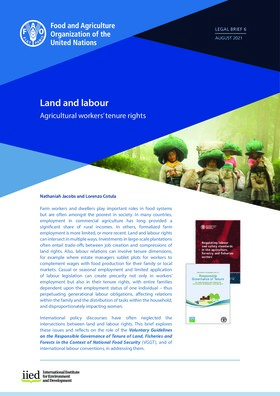Resource information
Land and labour rights can intersect in multiple ways. Investments in large-scale plantations often entail trade-offs between job creation and compressions of land rights. Also, labour relations can involve tenure dimensions, for example where estate managers sublet plots for workers to complement wages with food production for their family or local markets.
Casual or seasonal employment and limited application of labour legislation can create precarity not only in workers’ employment but also in their tenure rights, with entire families dependent upon the employment status of one individual – thus perpetuating generational labour obligations, affecting relations within the family and the distribution of tasks within the household, and disproportionately impacting women. International policy discourses have often neglected these intersections.
This brief explores these issues and reflects on the role of the Voluntary Guidelines on the Responsible Governance of Tenure of Land, Fisheries and Forests in the Context of National Food Security (VGGT), and of international labour conventions, in addressing them.

